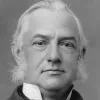We learned once for all that compromise makes a good umbrella, but a poor roof. It is a temporary expedient, often wise in party politics, almost sure to be unwise in statesmanship.
James Russell Lowell (1819-1891) American diplomat, essayist, poet
“Democracy,” speech, Birmingham, England (6 Oct 1884)
(Source)
On becoming President of the Birmingham and Midland Institute. Speaking of the years leading up to the US Civil War, with the unsuccessful application of compromise "to a question of fundamental morals" (slavery).
Quotations about:
expediency
Note not all quotations have been tagged, so Search may find additional quotes on this topic.
Convictions no doubt have to be modified or expanded to meet changing conditions […] but to be a reliable political leader sooner or later your anchors must hold fast where other men’s drag.
Margot Asquith (1864-1945) British socialite, author, wit [Emma Margaret Asquith, Countess Oxford and Asquith; Margot Oxford; née Tennant]
More or Less about Myself, ch. 3 (1934)
(Source)
Impatience and cutting corners: it’s the primate way. It got us down out of the trees and up to the top of the evolutionary heap as a species, which is a lot more like a slippery, mud-slick game of King of the Hill with stabbing encouraged than any kind of tidy Victorian great chain of being or ladder of creation.
Elizabeth Bear (b. 1971) American author [pseud. for Sarah Bear Elizabeth Wishnevsky]
Ancestral Night (2019)
(Source)
Wealthy friends, you’re quick to take offene.
It’s not good manners, but it saves expense.[Irasci tantum felices nostis amici.
Non belle facitis, sed iuvat hoc: facite.]Martial (AD c.39-c.103) Spanish Roman poet, satirist, epigrammatist [Marcus Valerius Martialis]
Epigrams [Epigrammata], Book 3, epigram 37 (3.37) (AD 87-88) [tr. McLean (2014)]
(Source)
The commentary by various authors indicates this is about wealthy patrons pretending to offense or other anger at their poorer clientele as an excuse for not being free with gifts. Closely parallel to 12.13.
(Source (Latin)). Alternate translations:Rich friends 'gainst poor to anger still are prone:
It is not well, but profitably done.
[tr. May (1629); also as Hay (1755)]My rich friends, you know nothing save how to put yourselves into a passion. It is not a nice thing for you to do, but it suits your purpose. Do it.
[tr. Bohn's Classical (1859)]To be angry is all you know, you rich friends.
You do not act prettily, but it pays to do this.
[tr. Ker (1919)]Rich friends, 'tis your fashion to get in a passion
With humble dependents, or feign it.
Though not very nice, 'tis a saving device,
Economy bids you retain it.
[tr. Pott & Wright (1921), "A Mean Trick"]You well-off people are well versed only
in cursing out your inferiors:
Un For Giving bitching is quite enriching.
[tr. Bovie (1970)]You weIl-off friends only know how to take umbrage. It's not a pretty way to behave, but it suits your book.
[tr. Shackleton Bailey (1993)]Not easy, having money, blood so blue,
Lotta gifts expected for all your crew.
Kinda tacky to get angry and just tell 'em all go screw.
But the rich gotta do
What the rich gotta do.
[tr. Ericsson (1995)]The rich feign wrath – a profitable plan;
’Tis cheaper far to hate than help a man.
[tr. Pott]How explain why the conspicuously rich
are so easy to offend? Ask their accountant.
He probably won’t tell you but he’ll know.
[tr. Halsey]
All truth is safe, and nothing else is safe; and he who keeps back the truth, or withholds it from men, from motives of expediency, is either a coward or a criminal, or both.
Max Müller (1823-1900) German-British philologist, Orientalist, religious studies founder
(Attributed)
(Source)
This is frequently cited to Muller's The Science of Religion (1872), a collection of lectures, but does not appear there. The earliest reference seems to be in the Introduction and advertisements of T. W. Doane, Bible Myths and their Parallels in Other Religions (1882). While most of the block of text Doane attributes to Muller can be found in Muller's Lecture 1, this phrase does not.
Nations are most commonly saved by the worst men in them. The virtuous are too scrupulous to go to the lengths which are necessary to rouse the people against their tyrants.
Horace Walpole (1717-1797) English novelist, letter writer
Memoirs of the Reign of King George III, Vol. 1, ch. 12 (1859)
(Source)
Variants:
- "The adventurer's career suggests the reflection that nations are usually saved by their worse men, since the virtuous are too scrupulous to go to the lengths needed to rouse the people against their tyrants." (Source)
- "The virtuous are too scrupulous to go to the lengths that are necessary to rouse the people against their tyrants."
- Modern paraphrase: "No great country was ever saved by good men because good men will not go to the lengths necessary to save it."
- Modern paraphrase: "No great country was ever saved by good men, because good men may not go to the lengths that may be necessary."
You judge a war according to who is in the right as long as you have no interest in the outcome; if you’re one of the participants, or if the result is going to have a major effect on you, then you have to create the moral principles that put you in the right — that’s nothing new, everyone knows it.
On some positions, Cowardice asks the question, “Is it safe?” Expediency asks the question, “Is it is politic?” Vanity asks the question, “Is it is popular?” But Conscience asks the question, “Is it right?” There comes a time when one must take a position that is neither safe, nor politic, nor popular, but he must do it because Conscience tells him it is right.
Martin Luther King, Jr. (1929-1968) American clergyman, civil rights leader, social activist, preacher
Speech, Santa Rita, Calif., (14 Jan 1968)
Recording (at 10:22). King reused speech elements frequently. The same passage can be found in "Remaining Awake Through a Great Revolution", sermon at the National Cathedral, Washington, DC (31 Mar 1968).
Where the very safety of the country depends upon the resolution to be taken, no considerations of justice or injustice, humanity or cruelty, nor of glory or shame, should be allowed to prevail. But putting all other considerations aside, the only question should be, “What course will save the life and liberty of the country?”
He who fights with monsters should look to it that he himself does not become a monster. And when you gaze long into an abyss, the abyss gazes also into you.
[Wer mit Ungeheuern kämpft, mag zusehn, dass er nicht dabei zum Ungeheuer wird. Und wenn du lange in einen Abgrund blickst, blickt der Abgrund auch in dich hinein.]
Friedrich Nietzsche (1844-1900) German philosopher and poet
Jenseits von Gut und Böse [Beyond Good and Evil], Aphorism 146 (1886) [tr. Hollingdale (1973, 1990)]
(Source)
Alternate translations:He who fights with monsters should be careful lest he thereby becomes a monster. And if thou gaze long into an abyss, the abyss will also gaze into thee.
[tr. Zimmern (1906)]Whoever fights monsters should see to it that in the process he does not become a monster. And when you look long into an abyss, the abyss also looks into you.
[tr. Kaufmann (1966)]
No man is justified in doing evil on the ground of expediency. He is bound to do all the good possible. Yet he must consider the question of expediency, in order that he may do all the good possible, for otherwise he will do none.
HAYWOOD: There are those in our own country, too, who today speak of the protection of country, of survival. A decision must be made, in the life of every nation, at the very moment when the grasp of the enemy is at its throat, when it seems the only way to survive is to use the means of the enemy, to rest survival upon what is expedient. To look the other way. Only the answer to that is: Survival as what?















